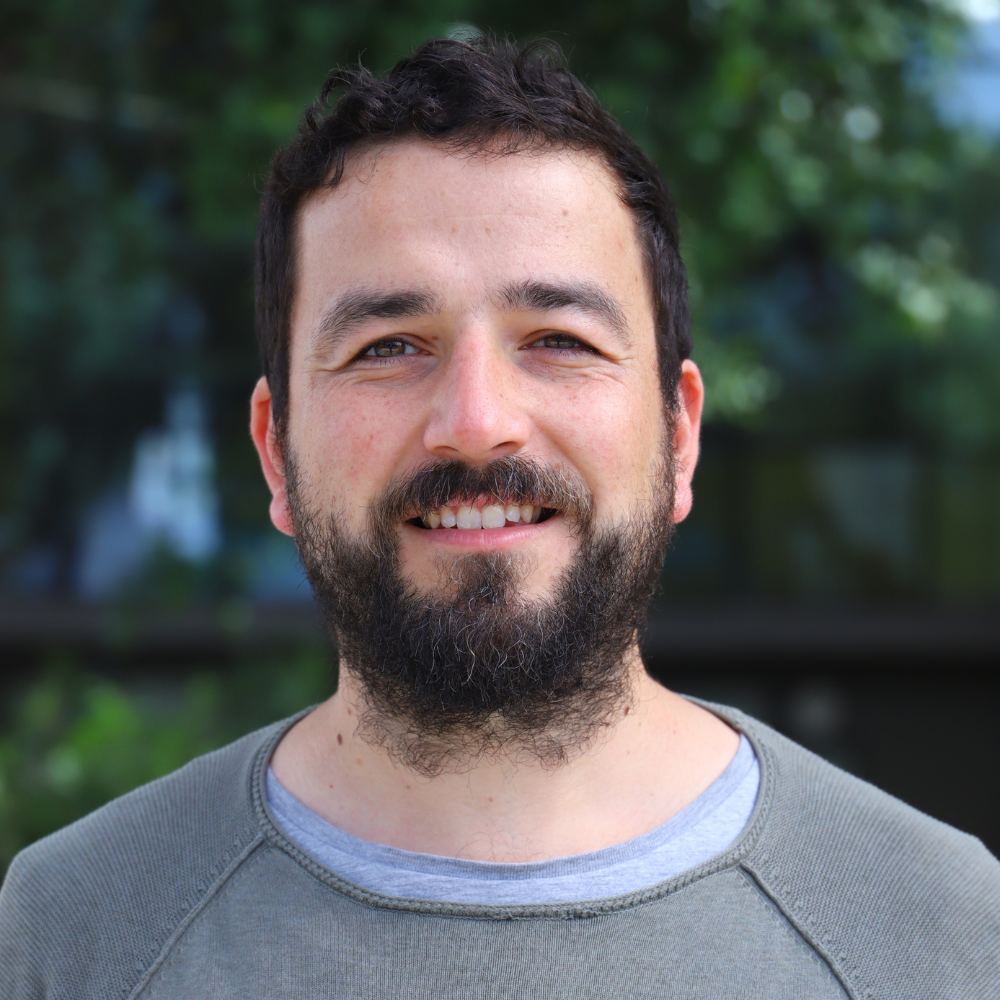10
Stefan Escaida ● Profesor Asistente

Doktor der Ingenieurswissenschaften (Dr.-Ing.), 2016, Karlsruhe Institute of Technology, Alemania
Diplom-Informatiker (Dipl.-Inform.), 2010, Karlsruhe Institute of Technology, Alemania
Descripción
Stefan Escaida recibió su título de Informático (Dipl.-Inform.) y su doctorado (Dr.-Ing.) en robótica del Karlsruhe Institute of Technology en 2010 y 2016 respectivamente. Durante su fase de doctorado investigó en temas como el reconocimiento háptico de objetos, manipulación de objetos, así como también la tecnología y las aplicaciones de sensores capacitivos táctiles y de proximidad. Dentro de las aplicaciones investigadas se encuentran el preajuste de garras, evitamiento de colisiones, teleoperación, etc.
Entre fines del 2017 y el verano del 2022 fue investigador postdoctoral en el laboratorio DEFROST en Inria Lille – Nord Europe en Francia. En este período trabajó en el sensado basado en modelos para Soft Robotics.
Desde octubre 2022 es profesor asistente en la Universidad de O’Higgins y desarrolla investigación en el área de Inteligencia Artificial y Robótica del ICI.
7
1
- REVISTA IEEE Robotics and Automation Letters
- 2025
Model-Based Capacitive Touch Sensing in Soft Robotics: Achieving Robust Tactile Interactions for Artistic Applications
• Stefan Raimundo Escaida Lubbemeier
- REVISTA Nonlinear Dynamics
- 2024
Estimating time-varying delays and parametric uncertainties in teleoperated robots
• Rohit Singla • Rodrigo Verschae • Stefan Raimundo Escaida Lubbemeier • Harish Parthasarath
- REVISTA IEEE Transactions on Instrumentation and Measurement
- 2023
Highly Stretchable Additively Manufactured Capacitive Proximity and Tactile Sensors for Soft Robotic Systems
• Stefan Raimundo Escaida Lubbemeier
- REVISTA IEEE Robotics and Automation Letters
- 2023
An Open Source Design Optimization Toolbox Evaluated on a Soft Finger
• Stefan Raimundo Escaida Lubbemeier • Luis Gustavo Molina Chávez
- REVISTA IEEE Robotics and Automation Letters
- 2023
Multi-tap Resistive Sensing and FEM Modeling enables Shape and Force Estimation in Soft Robots
• Stefan Raimundo Escaida Lubbemeier
- REVISTA IEEE Transactions on Medical Robotics and Bionics
- 2021
A Bio-Inspired Active Prostate Phantom for Adaptive Interventions
• Stefan Raimundo Escaida Lubbemeier
- REVISTA IEEE Transactions on Robotics
- 2021
Proximity Perception in Human-Centered Robotics: A Survey on Sensing Systems and Applications
• Stefan Raimundo Escaida Lubbemeier
- REVISTA IEEE Robotics and Automation Letters
- 2020
A Model-Based Sensor Fusion Approach for Force and Shape Estimation in Soft Robotics
• Stefan Raimundo Escaida Lubbemeier
- REVISTA IEEE Robotics and Automation Letters
- 2019
Modeling Novel Soft Mechanosensors Based on Air-Flow Measurements
• Stefan Raimundo Escaida Lubbemeier
- REVISTA at - Automatisierungstechnik
- 2015
Plug & produce by modelling skills and service-oriented orchestration of reconfigurable manufacturing systems
• Stefan Raimundo Escaida Lubbemeier
- 243587898
- Diciembre 2025 - Diciembre 2025
IEEE RAS Technical Education Program
- 243587898
- Marzo 2025 - Junio 2026
MagTecSkin: Novel Tactile Sensitive Electronic Skin based on Magnetic Technology
- 243587898
- Diciembre 2024 - Diciembre 2024
AIJ support grant for organizing the Third Latin American Summer School on Cognitive Robotics
- 243587898
- Diciembre 2024 - Diciembre 2024
IEEE CIS support grant for organizing the Third Latin American Summer School on Robotics
- 243587898
- Noviembre 2024 - Diciembre 2024
KhipuX grant for organizing the Third Latin American Summer School on Cognitive Robotics
- 11230505
- Marzo 2023 - Marzo 2026
A Sensorization Toolbox for the Realization of Soft Physical Twins: Applications to Phantoms of Human Organs
- 243587898
- Junio 2013 - Junio 2017
Methods for Exploration, Manipulation and Safe Human-Robot-Interaction with Capacitive Tactile Proximity Sensors
- 2015